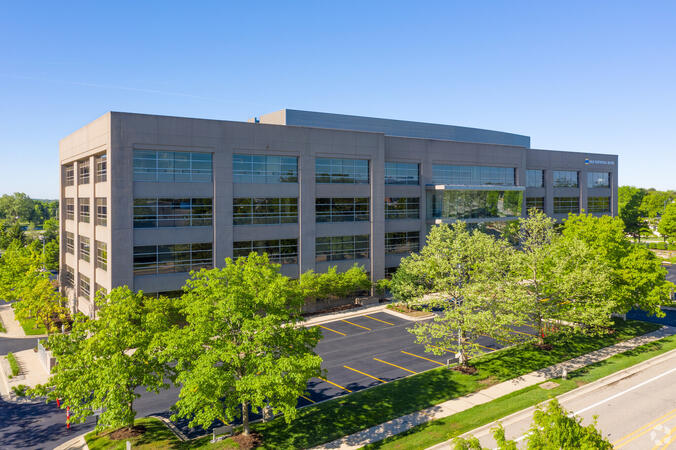400 Renaissance Center, Detroit, United States, 48243
Detroit, MI - Renaissance Center
The GM Renaissance Center is conveniently located in downtown Detroit and easily accessed by car via Interstates 75 or 94, with secure underground parking available on site. Travelers flying into Detroit Metropolitan Airport (DTW) can expect a 25–30 minute trip by taxi or rideshare via I‑94. Public transit is efficient: the Detroit People Mover stops directly at the Renaissance Center station, and DDOT routes 3 and 9 serve nearby Jefferson Avenue. Pedestrian skywalks provide safe indoor access from downtown hotels, parking garages, and the riverwalk.
Ann Arbor, MI – Regus - South State Commons I
2723 S State St, Ann Arbor, United States, 48104
Regus South State Commons I is conveniently located off I‑94 via Exit 177 (State Street), with easy access to downtown Ann Arbor and surrounding suburbs. The building offers free on-site surface parking for guests. From Detroit Metropolitan Airport (DTW), the venue can be reached in approximately 20–25 minutes by taxi or rideshare via I‑94 West. Local public transit service (TheRide) operates Route 24 along South State Street, with a stop within a short 2-minute walk of the building.
Grand Rapids, MI - Regus – Calder Plaza
250 Monroe Ave NW, Grand Rapids, United States, 49503
The venue sits centrally at 250 Monroe Avenue NW in downtown Grand Rapids, easily accessed by car via US‑131 or I‑196—with connections via Monroe or Ottawa exits—and offers shared underground and surface parking. From Gerald R. Ford International Airport, take I‑96 East then I‑196 West into the city; the drive is about 20 minutes. Public transit through Rapid bus routes stops near Monroe or Ottawa Avenue, just a short walk from the Regus entrance; the downtown area is pedestrian-friendly.
Lansing, MI - Regus - One Michigan Avenue
120 North Washington Square, Lansing, United States, 48933
The venue is located in the heart of Lansing’s central business district at 120 North Washington Square, easily accessible by car via I‑496 or US‑127 with convenient street parking and a nearby parking ramp. From Capital Region International Airport (LAN), the location is approximately a 12‑minute drive west via I‑96 and US‑127, with taxis and rideshares readily available. Public transit users can take CATA bus routes that stop just a block away on Washington or Grand Avenue, offering seamless access to the venue.
Subcategories (1)
Explore Our Courses
Administration of Apache Spark
35 HoursBig Data Analytics in Health
21 HoursHadoop and Spark for Administrators
35 HoursSMACK Stack for Data Science
14 HoursApache Spark Fundamentals
21 HoursApache Spark in the Cloud
21 HoursSpark for Developers
21 HoursApache Spark SQL
7 HoursLast Updated:
Testimonials (7)
The live examples
Ahmet Bolat - Accenture Industrial SS
Course - Python, Spark, and Hadoop for Big Data
very interactive...
Richard Langford
Course - SMACK Stack for Data Science
Sufficient hands on, trainer is knowledgable
Chris Tan
Course - A Practical Introduction to Stream Processing
Get to learn spark streaming , databricks and aws redshift
Lim Meng Tee - Jobstreet.com Shared Services Sdn. Bhd.
Course - Apache Spark in the Cloud
practice tasks
Pawel Kozikowski - GE Medical Systems Polska Sp. Zoo
Course - Python and Spark for Big Data (PySpark)
The VM I liked very much The Teacher was very knowledgeable regarding the topic as well as other topics, he was very nice and friendly I liked the facility in Dubai.
Safar Alqahtani - Elm Information Security
Course - Big Data Analytics in Health
Richard is very calm and methodical, with an analytic insight - exactly the qualities needed to present this sort of course.
Kieran Mac Kenna
Course - Spark for Developers
Upcoming Courses
Other regions in the US
OnlineAlabama Birmingham MontgomeryArizona Phoenix TucsonArkansas Fayetteville Fort Smith Little RockCalifornia Los Angeles Sacramento San Diego San Francisco San Francisco Bay AreaColorado DenverConnecticut BridgeportDelaware DoverDistrict of Columbia Washington D.C.Florida Miami TampaGeorgia Atlanta Augusta SavannahHawaiiIdaho BoiseIllinois Chicago SpringfieldIndiana Fort Wayne IndianapolisIowa Cedar Rapids Des MoinesKansas Kansas City TopekaKentucky Lexington LouisvilleLouisiana Baton Rouge New OrleansMaine PortlandMaryland Annapolis BaltimoreMassachusetts Boston Cambridge WorcesterMichigan Detroit Grand Rapids LansingMinnesota MinneapolisMississippi Gulfport JacksonMissouri Jefferson City St. LouisMontana Billings HelenaNebraska Lincoln OmahaNevada Carson City RenoNew Hampshire Concord ManchesterNew Jersey Jersey City Newark TrentonNew Mexico Albuquerque Santa FeNew York Albany Buffalo New York CityNorth Carolina Charlotte Durham RaleighNorth Dakota Bismarck FargoOhio Cincinnati Cleveland ColumbusOklahoma Oklahoma City TulsaOregon Eugene SalemPennsylvania HarrisburgPhiladelphia PittsburghRhode Island ProvidenceSouth Carolina Charleston ColumbiaSouth Dakota Pierre Sioux FallsTennessee Knoxville Memphis NashvilleTexas Austin Dallas Houston San AntonioUtah Provo Salt Lake CityVermont Burlington MontpelierVirginia Richmond Virginia BeachWashington Olympia Seattle SeattleWest Virginia MorgantownWisconsin Madison MilwaukeeWyoming Casper Cheyenne
Other Countries
These courses are also available in other countriesConsulting
Apache Spark Consulting
Online Apache Spark training in Michigan, Apache Spark training courses in Michigan, Weekend Apache Spark courses in Michigan, Evening Spark training in Michigan, Apache Spark instructor-led in Michigan, Apache Spark coaching in Michigan, Spark instructor-led in Michigan, Spark private courses in Michigan, Online Spark training in Michigan, Apache Spark classes in Michigan, Evening Spark courses in Michigan, Apache Spark one on one training in Michigan, Spark boot camp in Michigan, Apache Spark trainer in Michigan, Apache Spark instructor in Michigan, Apache Spark on-site in Michigan, Weekend Spark training in Michigan




